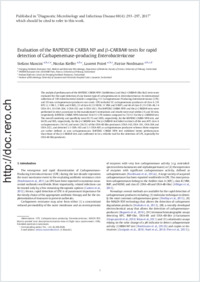Evaluation of the RAPIDEC® CARBA NP and β-CARBA® tests for rapid detection of Carbapenemase-producing Enterobacteriaceae
- Mancini, Stefano Emerging Antibiotic Resistance Unit, Medical and Molecular Microbiology, Department of Medicine, Faculty of Science, University of Fribourg, Switzerland - INSERM European Unit (LEA/IAME Paris, France), University of Fribourg, Switzerland - National Reference Center for Emerging Antibiotic Resistance, Switzerland
- Kieffer, Nicolas Emerging Antibiotic Resistance Unit, Medical and Molecular Microbiology, Department of Medicine, Faculty of Science, University of Fribourg, Switzerland - INSERM European Unit (LEA/IAME Paris, France), University of Fribourg, Switzerland - National Reference Center for Emerging Antibiotic Resistance, Switzerland
- Poirel, Laurent Emerging Antibiotic Resistance Unit, Medical and Molecular Microbiology, Department of Medicine, Faculty of Science, University of Fribourg, Switzerland - INSERM European Unit (LEA/IAME Paris, France), University of Fribourg, Switzerland - National Reference Center for Emerging Antibiotic Resistance, Switzerland
- Nordmann, Patrice Emerging Antibiotic Resistance Unit, Medical and Molecular Microbiology, Department of Medicine, Faculty of Science, University of Fribourg, Switzerland - INSERM European Unit (LEA/IAME Paris, France), University of Fribourg, Switzerland - National Reference Center for Emerging Antibiotic Resistance, Switzerland - Institute of Microbiology, University of Lausanne and University Hospital Center, Lausanne, Switzerland
-
01.08.2017
Published in:
- Diagnostic Microbiology and Infectious Disease. - 2017, vol. 88, no. 4, p. 293–297
English
The analytical performances of the RAPIDEC CARBA NP® (bioMérieux) and the β-CARBA® (Bio-Rad) tests were evaluated for the rapid detection of any known type of carbapenemases in Enterobacteriaceae. An international collection of 149 enterobacterial isolates comprising 111 Carbapenemase-Producing Enterobacteriaceae (CPE) and 38 non-carbapenemase producers was used. CPE included 32 carbapenemase producers of class A (18 KPC-2, 1 FRI-1, 5 SME and 8 IMI), 33 of class B (13 NDM, 11 VIM and 9 IMP) and 46 of class D (15 OXA-48, 14 OXA-181, 10 OXA-204, 3 OXA-232 and 4 OXA-162). The RAPIDEC CARBA NP® and the β-CARBA® tests were performed in strict accordance to the manufacturer's instructions and results were read within 2 h and 30 min, respectively. RAPIDEC CARBA NP® detected 104/111 CPE isolates compared to 72/111 for the β-CARBA® test. The overall sensitivity and specificity were 93.7% and 100%, respectively, for the RAPIDEC CARBA NP® test, and 64.9% and 90%, respectively, for the β-CARBA® test. The β-CARBA® test failed to detect all the non-KPC class A carbapenemases (14/14) and most (24/31) of the OXA-48-like producers (OXA-162, OXA-181, OXA-204 and OXA-232), and detected 1/1 OXA-163 and 1/1 OXA-405 as carbapenemase producers whereas these enzymes are rather defined as non carbapenemases. RAPIDEC CARBA NP® test exhibited better performances than those of the β-CARBA® test and confirmed to be a reliable tool for the detection of CPE, especially for OXA-48-like producers.
- Faculty
- Faculté des sciences et de médecine
- Department
- Médecine 3ème année
- Language
-
- English
- Classification
- Biological sciences
- License
-
License undefined
- Identifiers
-
- RERO DOC 305107
- DOI 10.1016/j.diagmicrobio.2017.05.006
- Persistent URL
- https://folia.unifr.ch/unifr/documents/306017
Statistics
Document views: 95
File downloads:
- pdf: 255
